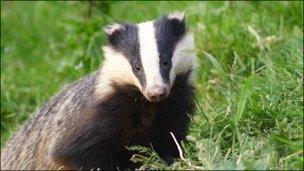Badger cull plan is revived in west Wales
- Published

Earlier plans for a badger cull were halted in the courts last year
Plans for a cull of badgers in west Wales have been revived, eight months after the assembly government was forced to shelve the proposal.
Ministers called off the cull - part of a plan to deal with bovine TB in cattle - when the Badger Trust won a challenge in the Court of Appeal.
Rural Affairs Minister Elin Jones has now said she decided to push ahead after fully considering the evidence.
The Badger Trust attacked the plans, but it was welcomed by farming unions.
Ms Jones also announced new controls to deal with TB in non-bovines, which include camelids - such as llamas and alpacas - goats and deer. Like cattle, they will be slaughtered if found to be infected by TB after tests.
The badger cull will be carried out in an intensive action area of north Pembrokeshire and neighbouring parts of Ceredigion and Carmarthenshire.
The new order has been drafted so it applies only to the intensive action area and not to the whole of Wales.
The cull is part of a plan to eradicate TB which includes stricter controls on cattle. Compensation for farmers whose livestock test positive has been linked to good practice.
In the last 10 years, £120m has been paid in compensation to Welsh farmers who have lost cattle to TB.
Ms Jones said: "Farmers, vets, valuers and Animal Health in Wales have all worked with us to bring about significant changes to how the disease is dealt with in cattle.
"After full consideration of the evidence presented to me, including consideration of the responses to the recent consultation on badger control in the Intensive Action Area, I have reached the decision to proceed with legislation which would enable a government-led cull of badgers in the Intensive Action Area."
She added: "It's not a decision that any government minister, myself included, takes lightly."
The evidence presented to her will be published on the assembly government's website.
In a statement, the Badger Trust said it was "deeply disappointed that the Welsh Assembly Government has resurrected its pointless proposal".
"The trust will be studying in detail the evidence presented to the minister and will be seeking legal advice," it said.
RSPCA wildlife scientist Colin Booty said: "We believe that this is a dead end policy in every respect. Not only will it result in the death of at least 70% of badgers from the cull area, but it will not resolve the problem in other areas of Wales."
If the order is not opposed by AMs, it will come into force on 31 March, otherwise there could be a debate and a vote in the Senedd.
In the chamber on Wednesday, Labour AM Lorraine Barrett urged the minister to postpone the cull until she had more information on the success of her earlier measures.
The assembly government says it cannot set a date for the start of the cull, and that it is too early to say whether measures to control disease are the reason for a recent improvement in TB figures.
Stephen James, NFU Cymru deputy president, said: "We believe that in proposing to tackle the disease in wildlife as well as cattle the government has embarked on the correct course of action."
FUW spokesman Brian Walters said: "There is only one approach which has been shown scientifically to reduce bTB incidences in hotspot areas where bovine TB is endemic in badgers, and that is culling."
The Pembrokeshire Against the Cull (PAC) group said it was "extremely disappointed" by the decision and Ms Jones had "again ignored the science, sound economics, human rights issues and the views of the overwhelming majority of the public".
PAC said in a statement: "Having presided over two flawed consultations, failure in the High Court and having spent significant sums of public money, Elin Jones once again ignores the facts and chooses a policy which can only end in failure with damage to our communities and disappointment for our local farmers."
- Published13 July 2010
- Published1 December 2010
- Published19 November 2010
- Published15 September 2010